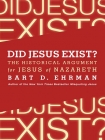Did Jesus Exist? - The Historical Argument for Jesus of Nazareth Bart Ehrman (books to read in your 20s txt) 📖

- Author: Bart Ehrman
Book online «Did Jesus Exist? - The Historical Argument for Jesus of Nazareth Bart Ehrman (books to read in your 20s txt) 📖». Author Bart Ehrman
But the embellishments do not mean that the event itself is made up, as we will see later. How does Price explain the appearance of the baptism account in the Gospels? In his view,
The scene in broad outline may derive from Zoroastrian traditions of the inauguration of Zoroaster’s ministry. Son of a Vedic priest, Zoroaster immerses himself in the river for purification, and as he comes up from the water, the archangel Vohu Mana appears to him, proffering a cup and commissions him to bear the tidings of the one God Ahura Mazda, whereupon the evil one Ahriman tempts him to abandon this call. (67)
Is this explanation really at the same level of historical probability as the explanation of the triumphal entry? Zoroastrianism? Vohu Mana? Ahura Mazda? These were the influences that determined how the story of Jesus’s baptism were told? For one thing, how can Price say that the entire Gospel is a haggadic midrash on the Old Testament if what he means is that it is a paraphrase of Zoroastrian scripture? Even if it is not historical, the story of Jesus’s baptism must go back to the very earliest Christian communities in Aramaic-speaking Palestine. How many Aramaic-speaking Palestinian Jews were influenced by accounts of Zoroaster’s initiation in the presence of the archangel Vohu Mana?
In short, many of Price’s explanations of where the Gospel stories came from are simply implausible. But my bigger point is that in many instances they are also irrelevant. Even if later storytellers chose to talk about Jesus’s baptism in light of something that once happened to Zoroaster—which seems highly unlikely, but if they actually did—this has no bearing on the question of whether Jesus existed and, in this case, very little bearing on the question of whether he really was baptized by John the Baptist. Just because a story is molded by a storyteller or author in light of his own interests does not mean that the story at its core is nonhistorical or that the person about whom it is told did not live. There is other, quite abundant, evidence that Jesus lived. And as we will see, there are solid reasons for thinking he was baptized. None of this evidence hinges on whether he began his ministry like Zoroaster.
Thomas Thompson and the Messiah Myth
Thomas Thompson recently published a book that advances a view similar to Price’s but approaches the matter from a slightly different angle. In The Messiah Myth: The Near Eastern Roots of Jesus and David, Thompson argues that just as Old Testament notables such as Abraham, Moses, and David were legendary, not historical figures, so too with Jesus, whose stories in the Gospels are not the result of oral traditions dating back to near his own time but are literary fictions invented by the Gospel writers and their predecessors.20
Thompson is a trained scholar of the Hebrew Bible and is well known in those circles for being what is called a minimalist, meaning that he thinks there is a very small amount of historical information in the Hebrew Bible. I do not need to enter into that debate here, as I am interested instead in how he transferred his understanding of the Old Testament traditions to the Gospel stories about Jesus. His book on Jesus (and David) consists of little more than a close reading of the Gospels, and he argues that the Gospels try to formulate their stories about Jesus in light of traditions found in the Old Testament. In his view the Gospel stories are constructed specifically as literary texts by authors who wanted to put their views of Jesus in written form. They are not, therefore, based on oral traditions that go back to near the time of Jesus himself. This is especially the case because in his view Jesus did not exist but was a literary invention of the early Christians.
Thompson’s book is not easy for a layperson to follow. It involves a close reading of texts, a reading that at times is excessively thick and virtually impenetrable. Those without training in biblical studies are not likely to be able to follow his argument let alone be persuaded by it. But his basic view is clear. The Gospel stories have literary functions that depend heavily on intertextual influences (meaning they are based on other texts—in this case, those of the Hebrew Bible). To understand these stories, the interpreter has to understand where the stories came from. From this assertion Thompson leaps to the conclusion that since the Jesus traditions are textual and literary, they are therefore not rooted in oral traditions and have no basis in actual history. To read the stories as historical narratives, in his opinion, is therefore to misread them.
In my judgment this view goes too far (way too far) and is based on a non sequitur. To say that our Gospel stories are based in many instances (he would say all, but that is surely an exaggeration) on earlier literary texts does not necessarily mean that the stories were invented as written traditions instead of existing first as oral traditions. Even people telling stories, as opposed to writing them, could be influenced by earlier writings that were in broad circulation. And it needs to be remembered always that we have solid and virtually incontrovertible evidence that the stories of Jesus were circulated orally before being written down. For one thing, there is no other way to explain how Christianity spread throughout the Roman world, as followers of Jesus converted other people to believe, not by showing them books (almost all of them were illiterate) but by telling stories about Jesus. Moreover, we have a number of authors who explicitly tell us that stories about Jesus were being transmitted orally. Paul says that he is passing on traditions he has heard (1 Corinthians 11:22–24; 15:3–5); Luke indicates that his predecessors based their accounts on oral traditions (1:1–4); the author of the Fourth Gospel





Comments (0)